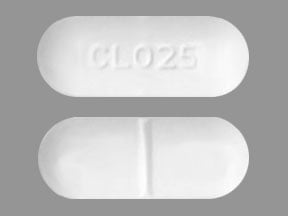
Colchicine-probenecid Coupons & Savings Card – Discount Prices from $43.83
My prescription
Edit
0.5-500MG, Colchicine-probenecid (90 Tablets)
Select pharmacy

CVS
$66.15
COUPON PRICE
Walgreens
$43.83
COUPON PRICE
Albertsons
$89.68
COUPON PRICE
Walmart
$94.27
COUPON PRICEColchicine-probenecid savings card
Show this card to your pharmacist
Walgreens
$43.83
BIN
ID
PCN
GRP
015995
LHKPR614818
GDC
DR33
Powered by
Colchicine-probenecid dosage forms
Dosage Quantity Price from Per unit 0.5-500MG 90 Tablets $66.15 $0.73 0.5-500MG 10 Tablets $11.97 $1.20 0.5-500MG 30 Tablets $30.24 $1.01 0.5-500MG 60 Tablets $44.87 $0.75 0.5-500MG 180 Tablets $106.00 $0.59
| Dosage | Quantity | Price from | Per unit |
|---|---|---|---|
| 0.5-500MG | 90 Tablets | $66.15 | $0.73 |
| 0.5-500MG | 10 Tablets | $11.97 | $1.20 |
| 0.5-500MG | 30 Tablets | $30.24 | $1.01 |
| 0.5-500MG | 60 Tablets | $44.87 | $0.75 |
| 0.5-500MG | 180 Tablets | $106.00 | $0.59 |
Colchicine-probenecid Warnings
This safety guide provides essential information about the potential risks and necessary precautions when using this medication. It is crucial to review these details and consult your healthcare provider if you have any concerns.
Increased Risk of Gout Attacks: Some individuals may experience more frequent gout flares when starting on probenecid/colchicine. Should this occur, contact your healthcare team immediately. They may prescribe an additional medication, such as allopurinol (Zyloprim), to help manage and prevent gout attacks.
Kidney Stones and Injury: The use of probenecid/colchicine can lead to the development of kidney stones, which may sometimes result in kidney injury. This risk is elevated in individuals with a history of kidney issues or those who have previously had kidney stones. Factors increasing risk include dehydration and pre-existing kidney problems.
Abnormal Blood Conditions: Individuals with a genetic condition known as G6PD deficiency are at an increased risk for rare but serious blood disorders when taking probenecid. If you have this deficiency or experience related symptoms, consult your prescriber about alternative gout medications that may be safer for you.
Contraindications
This medication should not be used under certain conditions due to potential serious health risks. If any of the following apply to you, speak with your healthcare provider before starting the medication:
- Experiencing a current gout attack
- Children under 2 years of age
- Currently pregnant
- Existing abnormal blood conditions
- Presence of uric acid kidney stones
Always ensure your healthcare provider is aware of your medical history to avoid adverse effects.
Colchicine-probenecid Side Effects
Common side effects:
- Headache
- Dizziness
- Nausea
- Vomiting
- Diarrhea
Less common but important to monitor:
- Kidney stones
- Sudden gout attacks
- Nerve pain
- Muscle weakness
- Hair loss
Serious side effects:
- Persistent nausea or vomiting
- Severe diarrhea
- Muscle pain
- Numbness or tingling in extremities
- Unusual bleeding or bruising
- Signs of infection like a persistent sore throat or fever
- Dark urine
- Yellowing of the skin or eyes
- Fast heartbeat
- Shortness of breath
- Signs of kidney problems, such as changes in urination
- Severe allergic reaction (rash, severe dizziness, itching or swelling, difficulty breathing)
Colchicine-probenecid Interactions
Interactions with high risk of serious adverse effects and should be avoided:
- Amiodarone
- Atazanavir
- Boceprevir
- Carvedilol
- Clarithromycin
- Cobicistat
- Conivaptan
- Cyclosporine
- Darunavir
- Diltiazem
- Dronedarone
- Erythromycin
- Flibanserin
- Idelalisib
- Indinavir
- Itraconazole
- Ketoconazole
- Ketorolac
- Lapatinib
- Lopinavir
- Nefazodone
- Nelfinavir
- Nilotinib
- Posaconazole
- Quinidine
- Ranolazine
- Ritonavir
- Saquinavir
- Sunitinib
- Telaprevir
- Telithromycin
- Tipranavir
- Vemurafenib
- Verapamil
- Voriconazole
Interactions with moderate risk that may require dose adjustment, closer monitoring, or timing changes:
- Abametapir
- Amprenavir
- Aprepitant
- Atorvastatin
- Avibactam
- Baricitinib
- Capmatinib
- Cephalexin
- Citalopram
- Crizotinib
- Deferiprone
- Delavirdine
- Doripenem
- Fenofibrate
- Fenofibric Acid
- Fluconazole
- Fluvoxamine
- Fosamprenavir
- Fosaprepitant
- Fosnetupitant
- Gemfibrozil
- Imatinib
- Indomethacin
- Interferon Alfa-2a
- Lasmiditan
- Letermovir
- Lovastatin
- Lumateperone
- Methotrexate
- Mibefradil
- Mifepristone
- Naproxen
- Netupitant
- Pegloticase
- Pexidartinib
- Pitavastatin
- Pravastatin
- Reserpine
- Rosuvastatin
- Sacituzumab Govitecan-hziy
- Simvastatin
- Tacrolimus
- Venetoclax
- Zalcitabine
Interactions with low risk that usually do not require a change in therapy:
- Amoxicillin
- Aspirin
- Bezafibrate
- Bismuth Subsalicylate
- CefditorenPivoxil
- Cefotaxime
- CefpodoximeProxetil
- Cefprozil
- Choline Magnesium Trisalicylate
- Ciprofibrate
- Ciprofloxacin
- Clofibrate
- Digoxin
- Enprofylline
- Ertapenem
- Fluvastatin
- Gatifloxacin
- Lorazepam
- Magnesium Salicylate
- Meropenem
- Norfloxacin
- Phenprocoumon
- Piretanide
- Pralatrexate
- Sodium Salicylate
- Sodium Thiosalicylate
- Zidovudine
- Zomepirac
